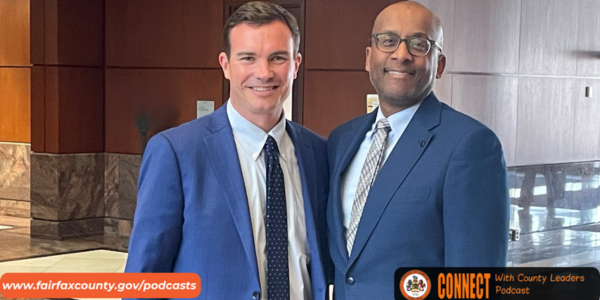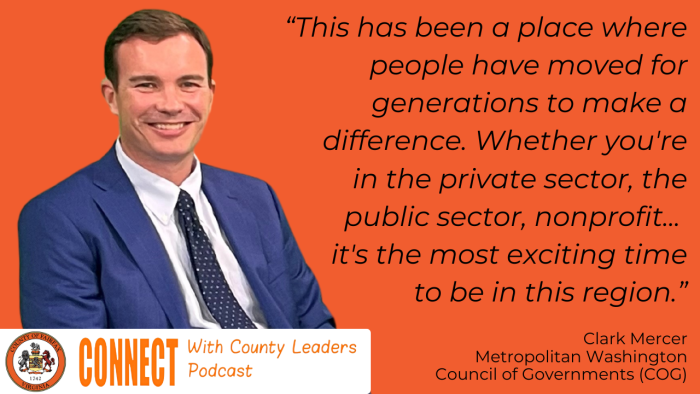
In a discussion that bridges past challenges with future opportunities, Clark Mercer, executive director of the Metropolitan Washington Council of Governments (COG), sat down with Fairfax County Executive Bryan Hill to share insights about regional cooperation, economic growth and the future of the DMV area.
From his unique perspective managing the COVID-19 response as a former chief of staff to Virginia’s governor to his current role coordinating between 24 local governments, Mercer offers an insider’s view of how the region’s leaders are working together to tackle pressing challenges.
WATCH
Leading Through Crisis and Transition
Before taking the helm at COG, Mercer played a crucial role in Virginia’s COVID-19 response as chief of staff to then-Governor Ralph Northam.
During this challenging period, Virginia achieved one of the lowest per-capita death rates in the country, ranking in the top 10 states for saving lives. However, the pandemic’s impact extended far beyond public health statistics.
“It was a tough time for the country. It was a tough time for the commonwealth,” Mercer reflected. “Being in Richmond, being the governor’s chief of staff... you’d make a decision and take an action, and I felt like half the state would feel like you didn’t go far enough and the other half that you went too far.”
The Role of Regional Coordination
The Metropolitan Washington Council of Governments serves as a vital connector between 24 local governments in the Washington metropolitan area. While its founding purpose was to coordinate on growth and transportation planning, COG’s mission has expanded to address regional challenges including affordable housing, homelessness, mental health services, environmental protection and public safety.
Mercer emphasized the importance of thinking regionally.
“We live, work and play across boundaries every day. Clean air, clean water doesn’t stop at a border on a map. Public safety. These are issues that you think, and hope government should be coordinating on to deliver better services to your citizens.”
Growth and Housing Challenges
The DMV region faces significant growth projections, with an anticipated increase of 1.5 million people and 1.1 million jobs by 2050. Fairfax County alone is expected to add 200,000 residents – more than the current population of Alexandria. This growth presents both opportunities and challenges, particularly in housing affordability.
“When you’re trying to recruit a company, one of the first things they’ll look at is, do we have the workforce? And we do. We’ve got great colleges, great high schools. We’ve got a smart dynamic workforce. But can they live here? And is it going to be affordable?”

Transportation and Transit Solutions
A major focus of COG’s work involves coordinating regional transportation solutions, particularly through the DMV Moves initiative. This project aims to improve efficiency and coordination between various transit systems while developing sustainable funding models for the Metro system.
The initiative seeks to establish predictable funding mechanisms that allow for long-term planning while maintaining accountability.
Currently, COG is working with leaders from Virginia, Maryland, D.C., and the federal government to create more efficient transit networks and develop funding models that provide both stability and accountability.
Economic Development and Regional Competition
Looking to the future, Mercer emphasizes the importance of marketing the DMV region as a unified economic powerhouse. If the 24 jurisdictions within COG were considered as a single state, it would rank as the most educated and most diverse state in the country, with a GDP placing it in the top 10 nationally.
The region is actively working to establish itself as an Economic Development District, joining the 85% of the country that already operates within such designated areas. This designation would allow for more coordinated economic development efforts and stronger regional marketing to compete with other major metropolitan areas.
Climate and Environmental Initiatives
COG leads one of the nation’s first regional climate change initiatives through its Metropolitan Washington 2030 Climate and Energy Action Plan. The organization has already achieved its initial goal of reducing greenhouse gases by 20% by 2020 and is now working toward a 50% reduction by 2050.
Metropolitan Washington Council of Governments
COG is the one place in metropolitan Washington that regularly brings leaders together to develop solutions to the region’s major challenges. COG prepares plans enabling the region to receive federal funding, provides members with research and data to inform decision-making, and offers a wide range of programs, including commuter services, cooperative purchasing, technical assistance and grants, and public outreach campaigns. Find COG online at www.mwcog.org.
Connect With County Leaders Podcast
The “Connect with County Leaders” podcast is a monthly opportunity to meet and connect with Fairfax County leaders, to learn about the latest county news and information, and hear more on specific programs and services in Fairfax County.
Listen or watch past episodes of “Connect with County Leaders” on SoundCloud, on YouTube and on Channel 16’s podcast on demand page. For other Fairfax County podcasts, visit www.fairfaxcounty.gov/podcasts, and for additional audio content, tune in to Fairfax County Government Radio at www.fairfaxcounty.gov/radio.



 SIGN UP FOR DAILY EMAIL HEADLINES
SIGN UP FOR DAILY EMAIL HEADLINES